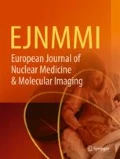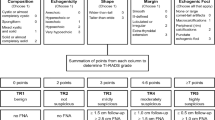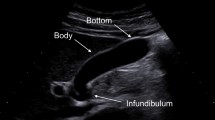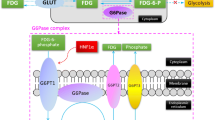Abstract.
Human adenocarcinomas of the gastroenteropancreatic system overexpress vasoactive intestinal peptide (VIP) receptors and therefore represent logical diagnostic targets for receptor scintigraphy. Using iodine-123 labelled VIP, the newly employed diagnostic procedure termed VIP receptor scintigraphy (VIP-RS) appears to detect tumour tissue, especially pancreatic metastatic tumours, in almost all cases. So far, however, only a single centre has demonstrated convincing positive results. The aim of this study was to compare the sensitivity and specificity of VIP-RS with those of computer tomography (CT) and transabdominal ultrasound in patients with extensive pancreatic metastatic adenocarcinomas and neuroendocrine tumours. VIP was radiolabelled with carrier-free 123I using the chloramine T-method and preparative high-performance liquid chromatography for purification. Patients with metastatic pancreatic (n=12) and colorectal (n=3) carcinomas (adenocarcinoma: n=13, neuroendocrine tumour: n=2) were studied by VIP-RS, CT, ultrasound and, in one case, also by radioligand receptor autoradiography. Carrier-free radioiodinated VIP of maximum specific radioactivity maintained a high biological activity as determined by cAMP formation in receptor-expressing tumour cell lines. Intravenous injection of 123I-VIP did not cause any side-effects. Biodistribution, determined over 24 h, was high in the lungs and low in abdominal organs. Although all patients had extensive metastatic disease as evidenced by CT and ultrasound, VIP-RS was unable to detect either primaries or metastases in these patients. Only in two patients could a significant uptake of radiolabel be detected in organs directly infiltrated by the primary. To exclude false-negative findings, tumour tissue in one patient with a large primary, undetectable by VIP-RS, was analysed by radioligand receptor autoradiography and shown to be receptor positive. Moreover, in vitro receptor determinations showed that pancreatic carcinomas usually have fewer VIP receptors than the normal tissues to which they metastasize, like the liver. It is concluded that VIP can be radioactively labelled with maximum specific radioactivity while maintaining biological activity. Intravenous administration leads to a biodistribution almost identical to that reported previously. However, in contrast to these reports, very low sensitivity and specificity were observed for the detection of pancreatic cancers. In retrospect, these findings are not surprising since VIP receptor expression was observed to be higher in normal tissues than in neoplastic ones.
Similar content being viewed by others
Author information
Authors and Affiliations
Additional information
Received 20 May and in revised form 12 June 2000
Electronic Publication
Rights and permissions
About this article
Cite this article
Hessenius, C., Bäder, M., Meinhold, H. et al. Vasoactive intestinal peptide receptor scintigraphy in patients with pancreatic adenocarcinomas or neuroendocrine tumours. Eur J Nucl Med 27, 1684–1693 (2000). https://doi.org/10.1007/s002590000325
Published:
Issue Date:
DOI: https://doi.org/10.1007/s002590000325




